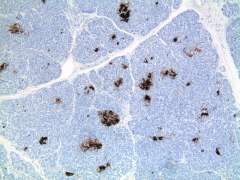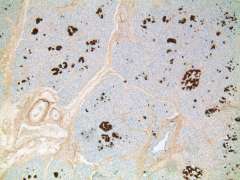Hyperinsulinism
Find your care
As leaders in endocrine care, our team delivers a precise diagnosis, effective treatments and compassionate support. Call 310-825-0867 to connect with an expert.
Congenital hyperinsulinism is a rare and complex disorder that can cause moderate or severe hypoglycemia (low blood sugar levels) in newborns and children. We are one of the few centers in the US with a dedicated Hyperinsulinism Team. We are also the only center in Southern California—and one of four in the US—with the capability to perform the specialized F-DOPA PET-CT scans often required during the diagnostic evaluation of these patients.
What is Hyperinsulinism?
Hyperinsulinism is a rare and complex disorder that can cause moderate or severe hypoglycemia (low blood sugar) in infants and children. It may be a temporary condition or permanent.
In hyperinsulinism there is dysfunction of the insulin-producing beta cells of the pancreas. In a normal pancreas, these cells release insulin only when there is ingestion of carbohydrates or proteins. In patients with hyperinsulinism, some or all of these cells are producing too much insulin. Insulin in turn acts to lower blood sugars, leading to hypoglycemia.
What causes Hyperinsulinism?
Hyperinsulinism can be caused by many factors. For example, babies born to mothers with gestational diabetes, or those who experience significant stress in utero, can be born with hyperinsulinism that can last for days to months. Hyperinsulinism may also be a genetic condition, due to a difference in a gene that a baby is born with. Finally, it may be part of other conditions, such as Beckwith-Weidemann or Kabuki syndrome.


How do you treat Hyperinsulinism in infants?
- When we diagnose a baby with hyperinsulinism the most important aspect of treatment is to prevent hypoglycemia. Severe infant hypoglycemia is very dangerous and can lead to seizures, coma, or death. We prevent hypoglycemia by giving IV fluids that contain dextrose (a sugar). We also start medications such as diazoxide, octreotide, lanreotide, or glucagon. In some cases we schedule the baby for a specialized 18F DOPA PET Scan that can be done here at UCLA. The scan results may help us determine whether we can do surgery to remove all or part of the pancreas. Surgery may cure or improve the hyperinsulinism.
What is the 18F DOPA PET Scan?
The 18F DOPA PET Scan is a special type of PET scan that uses a tracer that can specifically detect areas of hyperinsulinism. We usually use this scan when babies do not respond to medications, if the genetic testing indicates there may be a small area of hyperinsulinism in the pancreas, or if we suspect that the baby has Beckwith-Weidemann syndrome.
Contact Us:
- Appointments & Referrals - Phone: (310) 825-0867
- Administrative Office & Information - Phone: (310) 825-6244
- Website: Pediatric Endocrinology